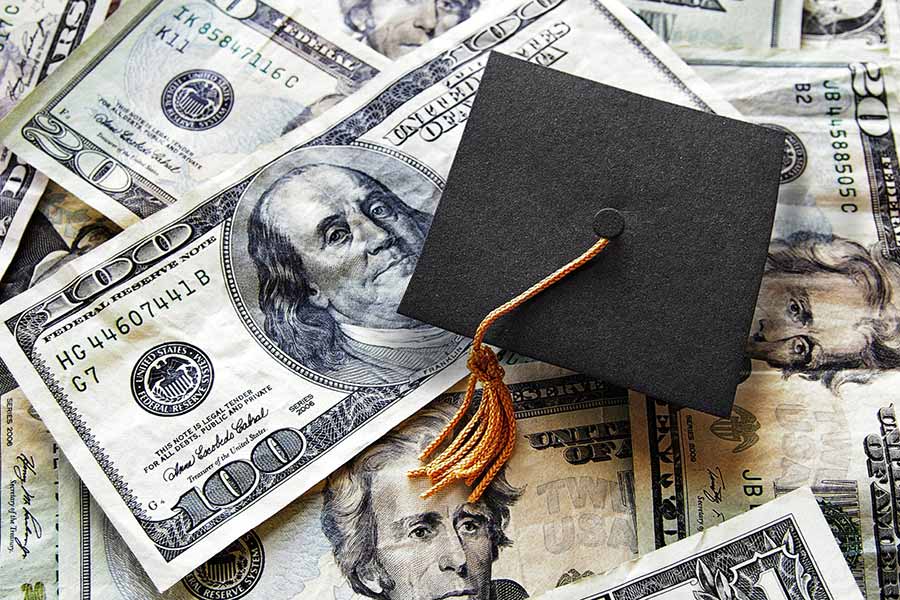Your student loans don’t just shape your monthly budget—they can shape your entire financial future. They influence everything from the credit cards you qualify for to the mortgage rate you’re offered.

As of 2024, the average student loan debt per borrower is around $38,883. And how you manage that debt plays a major role in your credit scores.
In this guide, we’ll break down exactly how student loans affect your credit—for better or worse—and how to stay in control of your scores while paying them off.
Key Takeaways
- Student loans can boost your credit score by helping you build a solid payment history and showing you can manage long-term debt.
- Missed payments or high balances can hurt your credit score and make it harder to qualify for new credit.
- Options like refinancing, deferment, forbearance, or income-driven repayment can help manage your credit—but each comes with trade-offs.
How Student Loans Can Help Build Your Credit Score
Student loans can actually strengthen your credit—if you manage them well. In fact, they can help establish the kind of credit history lenders want to see.
On-Time Payments Build a Strong Credit History
Payment history makes up the largest share of your credit score—about 35%. Making consistent, on-time student loan payments shows lenders that you’re reliable. Over time, this steady track record helps boost your credit scores and builds trust with future creditors.
Student Loans Can Add to Your Financial Profile
Unlike revolving debt like credit cards, student loans are installment loans with a fixed end date. That structure can signal financial stability and long-term planning to lenders.
And while student loans don’t build wealth directly, they can contribute to your net worth over time. College graduates typically earn more than those without a degree, which can lead to stronger income growth—and a greater ability to save, invest, and qualify for other credit.
How Student Loans Can Hurt Your Credit Score
Even though student loans are considered “good debt,” that label doesn’t protect your credit score if you fall behind on payments or carry too much debt overall. The damage often comes from poor management—not the loan itself.
Missed Payments Can Tank Your Credit
Payment history is the most important factor in your credit score—worth about 35% of your FICO score. So when you miss a student loan payment, it matters. If your payment is more than 30 days late, your loan servicer can report it to the credit bureaus. That late mark can stay on your credit report for up to seven years.
Fall 90 days behind, and your loan is considered delinquent. Keep going and you risk default, which can trigger even bigger credit damage (and collection activity).
High Student Loan Balances Can Still Hurt You
Even if you’re making your payments on time, high loan balances can weigh down your credit. That’s because lenders also look at your overall debt load and your debt-to-income (DTI) ratio when deciding whether to approve you for new credit.
A high DTI—too much of your income going toward debt payments—can make you look financially overextended, even if you’re current on all your bills. This can hurt your approval odds for a mortgage, car loan, or credit card.
What Refinancing Student Loans Does to Your Credit Score
Refinancing can be a smart move if you’re looking to lower your interest rate or reduce your monthly payment. But like any financial decision, it has trade-offs—and it can affect your credit score in a few ways.
Pros & Cons of Refinancing
The biggest benefit of refinancing is the potential for a lower interest rate—especially if your credit has improved since you first took out your loans. A better rate can reduce your monthly payments and the total amount you repay over time, making it easier to stay on track.
But there’s a major catch: if you refinance federal loans into a private loan, you lose access to federal protections. That includes income-driven repayment plans, loan forgiveness programs, and generous deferment options. If your income is unpredictable, or you work in public service, that trade-off could backfire.
How a Hard Credit Check Affects Your Score
Applying to refinance triggers a hard credit inquiry, which may lower your score by a few points temporarily. The good news? If you apply with multiple lenders within a short window (typically 14–45 days), credit scoring models usually count those inquiries as one.
Lower Payments Can Help Your Credit Over Time
Refinancing could actually boost your credit score in the long run. Lower payments mean it’s easier to pay on time, and consistent on-time payments are the most important factor in your credit score.
Also, if refinancing reduces your overall loan balance or lowers your monthly debt burden, it can improve your credit profile in the eyes of future lenders—even if your score doesn’t jump immediately.
How Student Loan Actions Affect Your Credit Score
Managing student loans isn’t one-size-fits-all—and each option affects your credit differently. Use this quick comparison to see how deferment, forbearance, refinancing, and default can shape your credit profile.
| Action | Does It Hurt Your Credit Score? | Notes |
|---|---|---|
| Deferment | ❌ No (if approved) | Payments are paused; interest may still accrue depending on loan type. Doesn’t damage your credit but may signal financial hardship to lenders. |
| Forbearance | ❌ No (if approved) | Similar to deferment. Credit score is not directly impacted, but interest always accrues. Could extend your payoff timeline. |
| Refinancing | ✅ Slight short-term dip, possible long-term gain | Causes a hard credit inquiry, which may temporarily lower your score. But lower payments can improve your score over time. |
| Default | ✅ Yes, significantly | Late payments and default can drop your score by 100+ points. The default stays on your report for up to 7 years. |
How Student Loan Deferment Can Impact Your Credit Score
Federal student loan borrowers have the option to defer loan payments temporarily under specific circumstances. However, these deferrals can have mixed effects on your credit score.
The Role of Interest During Deferment
The type of your federal student loan determines whether the government covers interest during the deferment period. Federal Perkins Loans, Direct Subsidized Loans, or Subsidized Federal Stafford Loans are eligible for this interest subsidy. However, unsubsidized loans or PLUS Loans aren’t eligible, meaning your loan will continue to accrue interest during deferment.
Interpretation of Deferment by Lenders
Deferment can be interpreted differently by lenders. Some might deny a personal loan application because they see a growing, deferred student loan. Others might disregard the deferred loan from your debt-to-income ratio because you’re not required to make payments, which could improve your chances of securing a loan.
What Happens to Your Credit Score If You Default on Student Loans
Defaulting on a student loan can seriously damage your credit score. If your payment is more than 90 days late, the lender reports it as delinquent to the credit bureaus. After 270 days without payment, the loan goes into default.
At that point, your account may be sent to collections, and your credit score could drop by 100 points or more. The default stays on your credit report for up to seven years, making it harder to qualify for new credit during that time.
But the impact doesn’t stop there. In some states, defaulting on a student loan can lead to suspended driver’s licenses or even professional license restrictions. That means your ability to work could be affected—especially if you’re in fields like healthcare or cosmetology.
While some states are trying to repeal these policies, they’re still on the books in many places. It’s worth checking your state laws to see what’s at stake.
Ready to Clean Up Your Credit Report?
Learn how credit repair professionals can assist you in disputing inaccuracies on your credit report.

Why Bankruptcy Usually Won’t Erase Your Student Loan Debt
Sometimes people with overwhelming debt consider filing for bankruptcy if it looks like they won’t ever be able to repay what they owe. And while this has severe financial consequences, there are some extreme circumstances where this might be the best option available.
The problem with both Chapter 7 and Chapter 13 bankruptcy is that neither one allows for the dismissal of student loans. So, even if you successfully file for bankruptcy, you will still owe your student loans. They will not be discharged.
The only exception to this rule is if you can demonstrate undue hardship.
You’ll need to prove three things:
- Poverty – that you won’t be able to afford basic living standards if you have to repay your student loan.
- Persistence – that your financial situation probably won’t change for the rest of the student loan repayment period.
- Good faith – that you have done your best in trying to repay your loans.
This exception is tough to achieve. So, don’t file for bankruptcy automatically assuming you’ll qualify to have your student loans discharged. It’s always wise to talk to a lawyer before taking any action.
How to Protect Your Credit Score While Paying Off Student Loans
Despite the challenges, several strategies can help you manage your student loan debt effectively and protect your credit score:
- Goodwill adjustment: If you have late payments on your credit history, consider writing a goodwill letter to your loan servicer, explaining why the payment was late and requesting removal of the late payment record. This strategy is especially effective if you can demonstrate extenuating circumstances and have otherwise been a good customer.
- Disputing errors: Occasionally, errors occur on credit reports, such as a loan being listed multiple times. Regularly checking your credit report enables you to catch and dispute these errors with credit bureaus promptly.
- Consistent payments: On-time monthly payments are critical to maintain and improve your credit score. Consider setting up automatic payments to ensure you never miss a deadline.
- Refinancing: If your interest rate is high, consider refinancing your student loans. This process can potentially lower your monthly payments, making them more manageable.
- Income-driven repayment plan: If you have federal student loans, consider enrolling in an income-driven repayment plan. This plan tailors your student loan payments to your income, making them more manageable.
Bottom Line
Student loans can either build or hurt your credit score—it all comes down to how you manage them. On-time payments help strengthen your credit profile, while missed payments or high balances can drag it down. Even actions like refinancing or deferment come with trade-offs that can shift your credit standing in different ways.
The key is staying proactive. Know your repayment options, track your balances, and take action early if you’re struggling to keep up. Managing student loans well doesn’t just protect your credit score—it sets you up for better financial opportunities down the road.
Frequently Asked Questions
Can paying off my student loans early hurt my credit score?
Paying off student loans early can initially lower your credit score slightly due to the reduction of your credit mix (diversity of loan types). However, in the long run, reducing your overall debt is generally beneficial for your financial health.
Does consolidating my student loans affect my credit score?
Consolidating your student loans can temporarily lower your credit score due to the hard credit check that is part of the application process. However, over the long term, if consolidation helps you manage your payments better and lower your debt, it could positively affect your credit score.
Do student loans have a statute of limitations?
Most private student loans have a statute of limitations, which varies depending on the contract and state law. Federal student loans, on the other hand, do not have a statute of limitations, and the government can take actions to collect the debt indefinitely.




